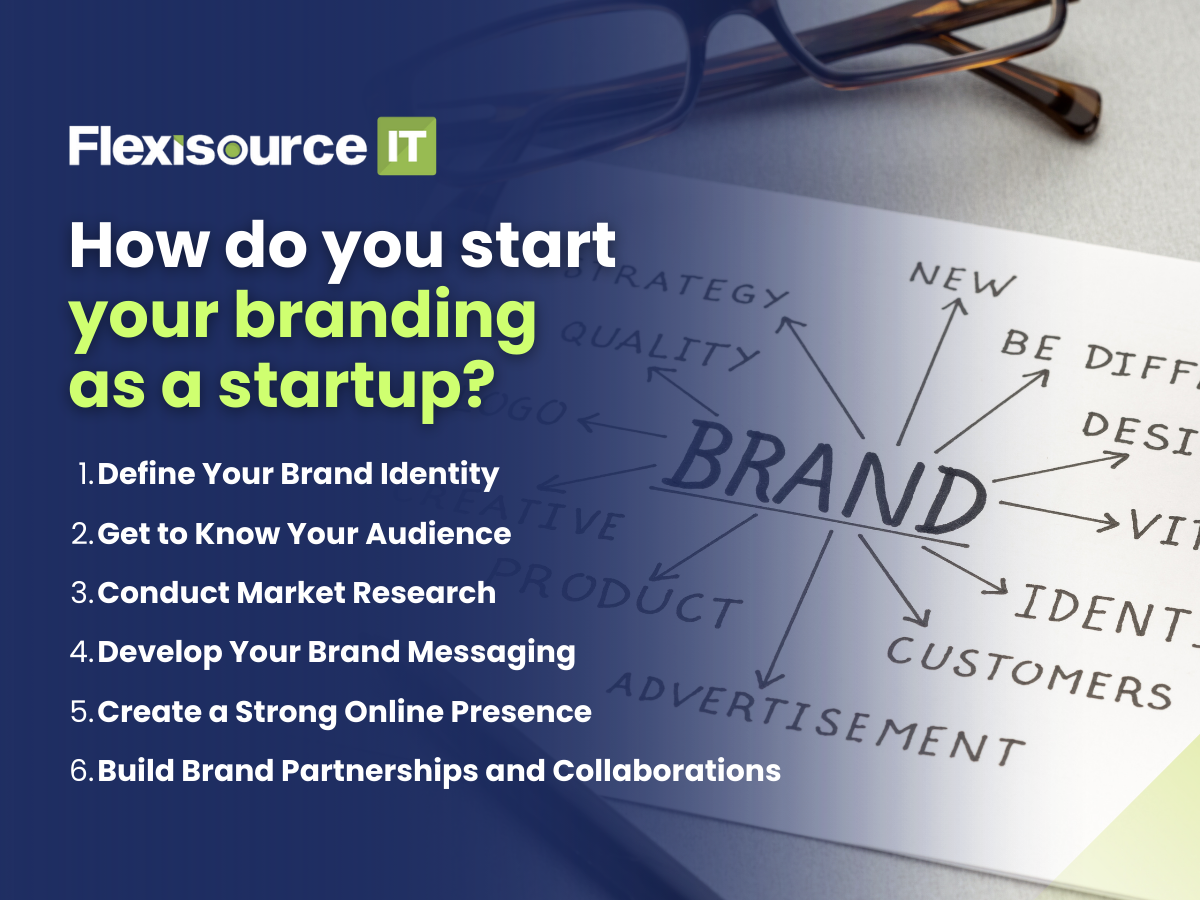You’ve decided to take the plunge into the exciting world of startups – congrats! Now, picture this: You’ve got this incredible idea just waiting to change the game.
But how do you ensure your startup stands out in a sea of competitors? That’s where the magic of branding comes in.
In this article, we will dive deep into the power of branding and how it can help you create a strong identity for your startup. So, let’s get ready to unleash the full potential of your branding for startups.
What is Branding?
Before jumping right into the core of this article, it is first essential to know “what is branding?”
Take it this way. Imagine you’re at a crowded marketplace. There are stalls everywhere, each selling similar items. Now, how do you decide which stall to visit? Maybe it’s the one with the colourful sign that catches your eye or the one you’ve heard good things about from friends. That’s essentially what branding is all about.
Branding is the process of creating a unique identity and story for your business or product that makes it stand out from the competition. It helps you connect with your customers emotionally and build trust and loyalty. It’s the logo, the colours, the fonts they use, the tone of their advertisements, and even the feelings and associations they evoke in people’s minds when they think about them.
So, in a nutshell, branding is the art of making a memorable impression and building a solid connection with your audience. It makes you stand out in a crowded marketplace and leaves a lasting impact on people’s minds.
What is the Importance of branding for startup businesses?
As a new business, startups must stand out in the sea of competition. However, this may be challenging as many other companies are doing something like your business. This is where branding can save the day.
With that said, here are several reasons why branding is crucial for startup businesses:
- Differentiation. First off, branding for startups helps you stand out from the crowd. It allows businesses to discover a unique identity and distinguish themselves from similar companies. And that’s key because you want people to remember you, not just blend in with everyone else.
- Building Trust. A strong brand inspires trust and credibility among consumers. People are likelier to buy from a trusted brand, especially when you’re just starting. With that said, startups need to establish trust quickly to attract customers, and a well-crafted brand can help convey professionalism and reliability.
- Attracting Customers. Good branding isn’t just about looking pretty—it’s about connecting with your audience on a deeper level. Effective branding for startups attracts customers by creating emotional connections and resonating with their values and preferences. It helps startups attract their target audience and encourages repeat business.
- Value Perception. Branding influences how customers perceive the value of products or services offered by a startup. A strong brand can command higher prices and create a perception of quality and prestige.
- Facilitating Growth. As startups grow, branding provides a solid foundation for expansion. A well-defined brand strategy helps maintain consistency across different channels and markets.
- Competitive Advantage. Branding can be a significant advantage in competitive markets. It helps startups effectively communicate their unique selling points and stay top-of-mind among consumers.
- Investor Appeal. Investors love a good brand story. For startups seeking funding, a strong brand can make them more attractive to investors. A compelling brand story can instil confidence in potential investors.
5 Elements of Strong Branding Identity
Let’s break down the five elements of a strong branding identity for startups:

Logo and visual identity
Visuals are your business’s face — it’s what people see first and remember. This is the most visible and recognizable aspect of your brand. It includes your logo, colour palette, typography, imagery, and other design elements that convey your brand’s personality and style.
With that said, a great logo and visual identity should be unique, memorable, consistent, and aligned with your brand’s purpose, mission, and values. It should also have consistent visual elements like colours, fonts, and design style to help create strong and recognizable branding for startups.
Mission, Vision, and Values
Mission, Vision, and Values are the guiding principles that drive your startup.
Basically, it defines what you do, why you do it, and how you do it. Your mission is your specific goal or objective, your vision is your long-term aspiration or impact, and your values are your guiding principles or beliefs.
With that said, branding for startups should have a clear and compelling mission, vision, and values that inspire your team, attract your customers, and differentiate you from your competitors. It should also help establish your brand’s identity and build customer trust.
Unique Selling Point (USP)
What sets your startup apart from the competition? Your Unique Selling Point. USP makes your brand, product, or service different and better than the alternatives. It could be a unique feature, a different approach, or a specific benefit only you offer.
Highlighting your USP helps attract customers who resonate with what makes you unique. This is what makes you special.
Your USP should highlight your key benefits, features, or advantages that solve your customers’ problems or needs. Likewise, a strong USP should be relevant, specific, and credible.
Compelling brand story
Every startup has a story, right? How it started, why it exists, and where it’s headed.
A brand story is essential as it connects your brand with your audience. It tells the story of who you are, where you came from, what you stand for, and where you are going.
Likewise, a compelling brand story should be authentic, engaging, and emotional. It should also showcase your brand’s personality, values, and mission. Moreover, it should also not only engage customers but also create an emotional connection with your audience.
Target Audience and Market Research
Understanding your target audience and market is critical to effective branding for startups.
With that said, always conduct audience and market research. Marketers should identify and understand their ideal customers and the market in which they operate. Likewise, collect and analyse data on your customers’ demographics, behaviors, preferences, needs, and challenges.
Lastly, ask yourself these questions? Who are your ideal customers? What do they need, want, and care about?
Through these data, you can tailor your branding efforts and messaging to resonate with your audience effectively.
How do you start your branding as a startup?
Building successful branding for startups involves much more than logos and visual elements. It should have a solid strategy to establish a strong market presence, attract customers, and differentiate from competitors.
Having said that, here are essential steps for startups to kickstart their branding journey.

Define Your Brand Identity
Alright, let’s start at the very beginning
Before diving into branding activities, it’s crucial to define your brand identity. Start by asking yourself some fundamental questions:
- What is the mission and vision of your startup?
- What values do you want your brand to embody?
- Who is your target audience, and what are their needs and preferences?
- What sets your startup apart from competitors?
Once you have clarity on these aspects, you can start crafting your brand identity, including your brand’s name, logo, colours, typography, and tone of voice. Consistency across these elements is critical to building brand recognition and trust.
Get to Know Your Audience
You wouldn’t try to snow coat to a tropical country, right? Exactly! To effectively position your branding for startups, you must understand your target audience and the competitive landscape.
Likewise, conduct thorough market research to gather insights into consumer behaviour, preferences, and trends. Identify your competitors and analyse their branding strategies to pinpoint gaps and opportunities.
Additionally, gather feedback from potential customers through surveys, focus groups, or interviews to validate your brand concept and ensure it resonates with your target audience.
Conduct Market Research
To effectively position your brand in the market, you must understand your target audience and the competitive landscape. Conduct thorough market research to understand consumer behaviour, preferences, and trends. Identify your competitors and analyse their branding strategies to pinpoint gaps and opportunities.
Additionally, gather feedback from potential customers through surveys, focus groups, or interviews to validate your brand concept and ensure it resonates with your target audience.
Develop Your Brand Messaging
Your brand messaging is how you communicate with your audience and convey your brand’s values, benefits, and personality. Develop a compelling brand story that captures the essence of your startup and resonates with your target customers. This narrative should be consistent across all your marketing channels and touchpoints.
Craft key messages highlighting your product or service’s unique selling points and addressing your target audience’s pain points. Use language that is clear, concise, and aligned with your brand’s tone of voice.
Create a Strong Online Presence
These days, if you’re not online, do you even exist?
In today’s digital age, having a robust online presence is essential for startups to reach their target audience and build brand awareness.
With that said, start by designing a professional website that reflects your brand identity and showcases your products or services effectively. Ensure your website is mobile-friendly and optimized for search engines to improve visibility.
In addition to your website, leverage social media platforms to engage with your audience and share valuable content. Choose the platforms where your target audience is most active and tailor your content to suit each platform’s unique features and audience preferences.
Lastly, invest in content marketing to establish thought leadership in your industry and provide value to your audience through blog posts, videos, infographics, and other relevant content formats.
Build Brand Partnerships and Collaborations
Two heads are better than one, right?
Collaborating with other brands or influencers can help amplify your reach and credibility, especially in the early stages of your startup journey.
Likewise, identify potential brand partners who share your target audience or complementary products/services and explore collaboration opportunities.
Whether co-hosting events, cross promoting each other’s products, or collaborating on content creation, strategic partnerships can help you tap into new markets and strengthen your brand positioning.
Conclusion
In summary, branding is more than fancy logos and catchy slogans. It’s about creating a meaningful connection with your audience. Moreover, it’s about standing out in a crowded market and building a brand people recognize, love, and trust.
If you’re ready to take your branding to the next level and unleash the full potential of your startup, look no further than Flexisource IT. Our team of experts is here to help you craft a compelling brand identity, connect with your target audience, and drive success for your business.
Start your branding journey with Flexisource IT! Contact us now!





